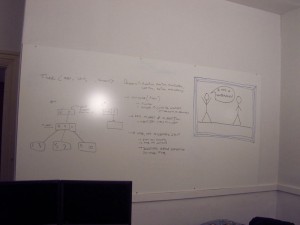So I was talking with a co-worker on Friday, and he mentioned that a friend of his has walls in his kitchen that he can write on using dry erase markers. It sounded really cool, but I said that I did not have the space for such a thing. However, I was sitting at my computer on Saturday when I realized that there was this *giant* empty space on my wall… so I started googling and decided to go get some tileboard from Home Depot.
And I found some stuff called “Thrifty White Tile Board”, which is approximately the same thing as a dry erase board, except I guess they take less time to wear out. It was 8ft x 4ft, and fits perfectly in the space where I had room (though, it did not fit in my car.. ). As you can see from the picture below, its worked out well so far!
Note: Yes, I realize the grammar for the title is bad.
